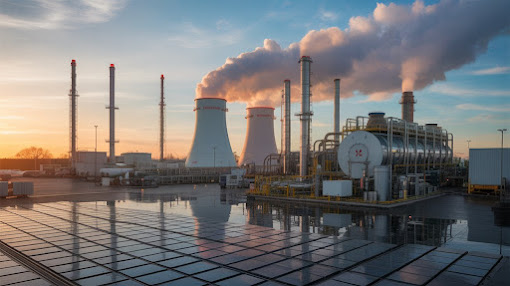Carbon-Neutral Energy System #sciencefather #researchawards #energy
🔬 Socio-Economic Implications of Implementing a Carbon-Neutral Energy System: A Green New Deal for Italy 🇮🇹
The global shift toward decarbonization has placed carbon-neutral energy systems at the forefront of sustainable development discourse. Italy 🇮🇹, in alignment with the European Union’s climate goals, is advancing its own Green New Deal, aiming for a fully carbon-neutral economy by 2050. For researchers, this transformation presents not only a critical policy challenge but also a multidisciplinary research opportunity spanning economics, environmental science, public policy, and social justice. 📚🧠
🌿 Understanding the Carbon-Neutral Imperative
Carbon neutrality refers to balancing carbon emissions with carbon removal or offsetting. This means transforming energy generation by replacing fossil fuels with renewables (solar ☀️, wind 🌬️, hydro 💧, and geothermal 🔥), enhancing energy efficiency, and investing in technologies like carbon capture and storage. The Italian Green New Deal places carbon neutrality at its core, alongside objectives such as employment growth, technological innovation, and regional equity.
📊 Economic Implications: Reshaping the Italian Economy
The move to a carbon-neutral system promises widespread economic impact, with both opportunities and transitional risks. Researchers need to evaluate:
-
Employment Shifts 👷♂️➡️🧑💻: Green sectors such as renewable energy, energy efficiency, and sustainable mobility could generate hundreds of thousands of new jobs. However, workers in traditional energy sectors may face displacement, requiring proactive reskilling initiatives and vocational transitions.
-
Industrial Innovation ⚙️💡: Italy’s industrial base must embrace innovation in clean technologies. Research into green hydrogen, smart grids, and battery storage can help reposition Italy as a leader in sustainable engineering and clean manufacturing.
-
Economic Resilience 📈💶: Reduced reliance on fossil fuel imports will improve energy security and balance of payments. Simultaneously, green investments can act as a stimulus tool, especially in post-COVID economic recovery.
🏘️ Social Equity and Regional Development
Socio-economic research plays a vital role in ensuring that Italy’s energy transition is just and inclusive:
-
Energy Poverty ⚡🚫: Low-income households may struggle with energy costs, especially during the transition period. Researchers must assess policy frameworks that support universal energy access, such as subsidies or energy vouchers.
-
Urban-Rural Divide 🌇🌄: Many renewable energy resources are rural-based, yet urban centers consume most energy. Policies must ensure that rural regions receive infrastructure upgrades, economic benefits, and digital access to participate in the transition.
-
Inclusive Participation 🧑🤝🧑: A successful Green New Deal requires public support. Social scientists can explore participatory governance models, community-led energy projects, and inclusive planning practices.
🧪 The Role of Academia and Research
For researchers, the Green New Deal offers a laboratory of change—a rare convergence of environmental, technological, and socio-political variables. Here’s how academia can contribute:
-
Interdisciplinary Collaboration 🤝📚: Addressing carbon neutrality requires a fusion of fields—engineering, economics, political science, law, and sociology. Research centers and universities must foster collaborative models that break traditional silos.
-
Policy Analysis and Impact Assessment 📑📊: Ongoing analysis of policy effectiveness, social impact, and emissions data can inform real-time adjustments. Evidence-based recommendations can bridge the gap between policy design and implementation.
-
Public Awareness and Communication 📢🧑🏫: Researchers also serve as communicators. Simplifying complex findings and engaging the public through science communication enhances trust and adoption of green measures.
🌎 Toward a Just and Sustainable Future
Italy’s journey toward a carbon-neutral future is not just a technological or economic process—it is a transformative socio-political endeavor. For researchers, it presents a fertile ground for studying transitions, justice, innovation, and human-environment interaction. The Green New Deal is a chance to co-create solutions that are scientifically sound, economically viable, and socially just. 💚
Let us not just observe this transition—let us be the architects of a greener, more inclusive future.
🔖 #Hashtags for Visibility
#GreenNewDealItaly #CarbonNeutralEnergy #EnergyTransition #SustainableResearch #CleanEnergyItaly #SocioEconomicChange #EnvironmentalJustice #GreenInnovation #AcademicResearch #ClimatePolicy #RenewableFuture #JustTransition #SmartEnergy #SustainabilityScience #Italy2050
#Phenomenology#ResearchAwards#
Twitter: https://x.com/compose/post
Instagram: https://www.instagram.com/
Pinterest: https://in.pinterest.com/
Blogger: https://phenomenological21.



Comments
Post a Comment